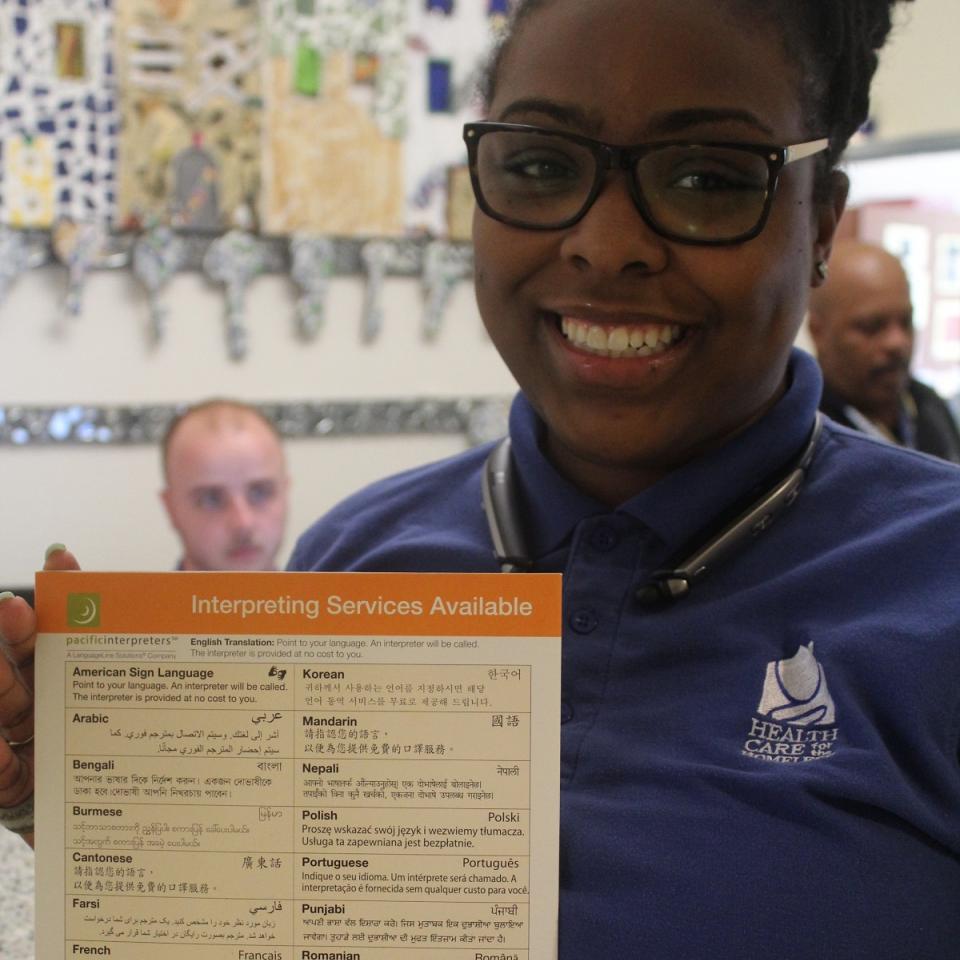Have you ever felt like throwing up your hands in frustration? Sometimes it can feel like “nothing” is working or “everything” is against you. Each of us has strengths. Even if the odds are truly against us, there are actions we can take.
The Mayor’s Office of Homeless Services has declared a winter shelter warning for Tuesday, January 14, 2025 at 4 pm until Thursday, January 14, 2025, at 9 am. Call 211 (available 24/7) or 443-984-9540 to connect with shelter. Get more info here.



10.16.18
Going to the doctor can be a whole production. You have to figure out who takes your insurance, what paperwork you need, where to fill your prescriptions, and, if you’re really sick, how to see a specialist. Imagine going through these steps in another language or after experiencing one of the most difficult situations of your life.
“English isn’t the first language for 15% of our clients, and others may be recovering from trauma or experiencing impairments that make communication difficult,” says Client Access Associate Ieshia Carr. “Some people don’t know when their next appointment is or the steps needed to schedule their referral. If they have a hard time communicating with us, they are going to leave without their health needs being met.”
This past June, Ieshia joined our agency’s Special Accommodations Workgroup to better address clients’ language, literacy, hearing and visual impairment needs. So far, the workgroup has conducted a language assessment survey with 66 clients in Spanish. It has also distributed language ID cards throughout our clinics that enable clients to indicate their preferred language and prompt staff to call an interpreter.
Currently, we use a phone interpretation service to communicate with clients in different languages and make sure all client forms and documents are available in Spanish. At our downtown clinic, a full-time Spanish-speaking volunteer is on hand to help clients navigate the clinic, and we have staff members across our sites who occasionally step in to support non-English speaking clients. We also have text telephones (TTY) to communicate with clients who are hearing or speech impaired. The 11-member workgroup is assessing how clients experience our existing language resources and what services they would like to see in the future.
“The workgroup primarily aims to develop consistent ways and resources to help clients communicate more easily at all stages of their care here—from checking in to explaining their situation to a doctor,” says Ieshia. “The work is really exciting. Not only am I helping clients, but I get to meet new people and everyone's voice is heard.”
Next up: The workgroup is planning to conduct the client survey with people who speak languages other than Spanish, and improved signage for clients who are visually impaired or have limited literacy.
Are you or do you know a client whose primary language is not English or Spanish? Email Josh Brusca to take the language assessment survey!
More Recent News
Send one email today to advocate for housing that serves all Marylanders. Let Governor Moore know that more permanent supportive housing is a good thing—and urge him to stay the course.
At our annual staff holiday party, we take time to honor and celebrate staff members who best represent our Core Values and one HCH-er at Heart.
Larrice is a mother, grandmother, teacher, cook and storyteller who was recently featured in our original documentary, “Taking Care: Portraits from Baltimore.”


